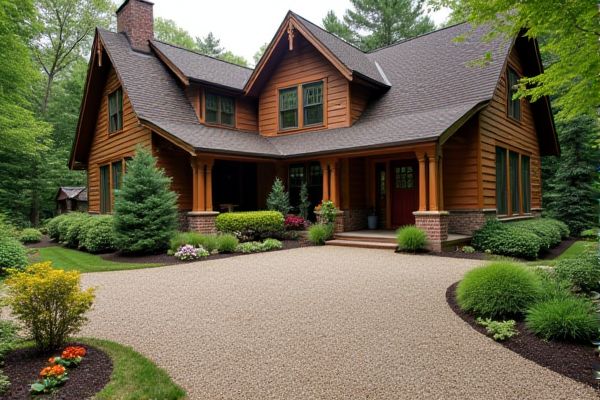
Mulch and gravel both serve as effective ground covers but have distinct benefits--mulch enriches soil by retaining moisture and decomposing naturally, while gravel offers superior drainage and low maintenance without organic decay. Discover which option best suits your landscaping needs by reading the full article.
Table of Comparison
| Feature | Mulch | Gravel |
|---|---|---|
| Material | Organic (wood chips, bark) | Inorganic (stones, pebbles) |
| Cost | Low to moderate | Moderate to high |
| Installation | Easy, spreadable by hand | Requires leveling and base layer |
| Maintenance | Needs replacement annually | Low, occasional cleaning |
| Water Retention | High, retains moisture | Low, promotes drainage |
| Weed Control | Moderate, breaks down over time | High, long-lasting barrier |
| Temperature Regulation | Keeps soil cooler | Can increase soil temperature |
| Aesthetic | Natural, earthy look | Modern, clean appearance |
| Environmental Impact | Biodegradable, eco-friendly | Non-biodegradable, may heat soil |
Introduction to Mulch and Gravel
Mulch is an organic or inorganic material spread over soil to retain moisture, regulate temperature, and suppress weeds, while gravel consists of small, loose stones used for drainage and decorative landscaping. Mulch typically improves soil quality over time as it decomposes, whereas gravel provides durable, low-maintenance ground cover that prevents erosion. Your choice between mulch and gravel depends on the desired function, aesthetic appeal, and maintenance level for your landscaping project.
Key Differences Between Mulch and Gravel
Mulch is an organic material like wood chips or bark that decomposes over time, enriching soil and retaining moisture, whereas gravel is an inorganic, durable material used primarily for drainage and low-maintenance landscaping. Mulch improves soil health by adding nutrients and promoting microbial activity, while gravel prevents weed growth and provides a long-lasting surface resistant to erosion. The key differences between mulch and gravel include their composition, environmental impact, longevity, and applications in garden and landscape design.
Pros and Cons of Using Mulch
Mulch improves soil moisture retention, regulates temperature, and suppresses weeds, promoting healthier plant growth. Organic mulch decomposes over time, enriching soil nutrients, but requires regular replenishment and can attract pests. It can be less durable than gravel, needing more frequent maintenance in high-traffic areas.
Pros and Cons of Using Gravel
Gravel offers excellent drainage and durability, making it ideal for pathways and driveways where low maintenance is a priority. However, gravel can shift and scatter over time, creating a need for periodic replenishment and potential weed growth beneath the surface. Your choice depends on whether you prioritize long-lasting ground cover or a more natural, organic option like mulch.
Aesthetic Impact: Mulch vs Gravel
Mulch offers a natural, warm aesthetic that enhances garden beds and complements plant life with rich, earthy tones, while gravel provides a clean, modern look with varied textures and colors that can define pathways or accent hardscaping. Mulch decomposes over time, enriching soil and supporting plant health, whereas gravel is long-lasting, low-maintenance, and ideal for drainage and erosion control. The choice between mulch and gravel depends on desired visual appeal, functional requirements, and garden style preferences.
Cost Comparison: Mulch and Gravel
Mulch generally costs between $15 to $60 per cubic yard, making it a more affordable option for large landscaping projects, while gravel typically ranges from $40 to $75 per cubic yard, reflecting its higher durability and maintenance-free benefits. Mulch requires replacement every 1 to 3 years, increasing long-term expenses, whereas gravel can last decades without needing replacement, offering cost savings over time. Factoring in installation and maintenance, mulch often demands more frequent upkeep costs compared to gravel, which can lead to higher initial investment but lower ongoing expenses.
Maintenance Requirements for Mulch & Gravel
Mulch requires regular replenishing every 1 to 2 years as it decomposes and compacts, along with occasional raking to maintain appearance and prevent mold growth. Gravel demands less frequent maintenance, primarily involving occasional weeding and replenishing every 3 to 5 years to replace displaced or buried stones. Choosing between mulch and gravel depends on your preference for upkeep frequency and garden aesthetics.
Best Applications for Mulch
Mulch is best applied in garden beds to retain soil moisture, regulate temperature, and suppress weed growth, creating an optimal environment for plant roots. Organic mulch like wood chips and bark decomposes over time, enriching soil with essential nutrients and improving soil structure. Your landscape benefits from mulch's ability to enhance aesthetic appeal while promoting healthier plant growth in areas with shrubs, flowers, and vegetable gardens.
Ideal Uses for Gravel Landscaping
Gravel landscaping is ideal for areas requiring excellent drainage and low maintenance, such as pathways, driveways, and patios. Its durability prevents erosion and compaction, making it suitable for high-traffic zones and around foundations. Your landscape benefits from gravel's ability to control weeds and improve water runoff, enhancing both functionality and aesthetic appeal.
Choosing the Right Material: Mulch or Gravel?
Choosing between mulch and gravel depends on factors like soil health, drainage, and aesthetic preferences. Mulch improves soil fertility and retains moisture, making it ideal for garden beds and plants requiring consistent hydration. Gravel provides superior drainage and durability, making it suitable for pathways and areas prone to erosion or heavy foot traffic.
 homyna.com
homyna.com